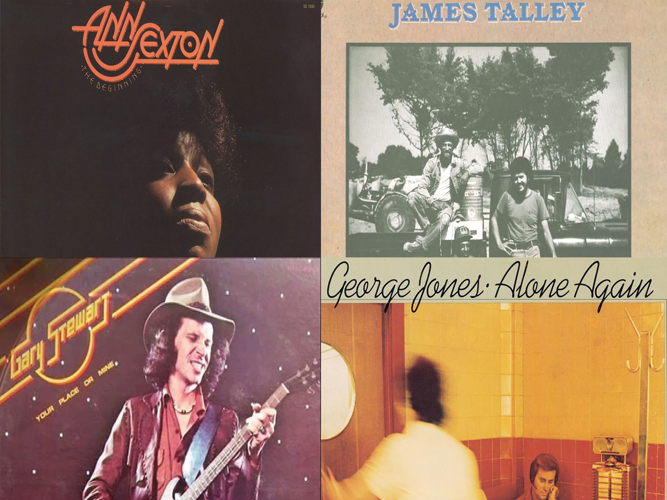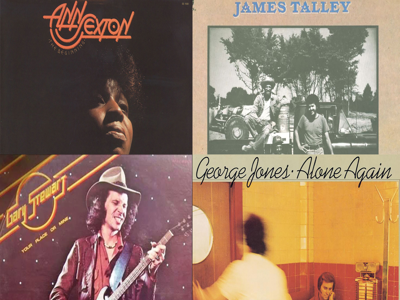
*Editor’s note: While social distancing to limit the spread of COVID-19 means that venues and record stores are closed to the public, we’re taking a look back at records that help tell the story of the evolving music scene in Music City, one decade at a time. It’s an occasional series that we’re calling Through Lines.
Like the rest of the pop-music universe, Nashville in the 1970s experienced a post-Bob Dylan sugar high. In Nashville, the period between Dylan’s 1966 Blonde on Blonde and director Robert Altman’s 1975 takedown of the politics of country music, Nashville, saw the rise of outlaw country and the apotheosis of studio-system country. Listening to rock and country records cut in Nashville between 1969 and 1979, you hear how progressive musicians tried to adapt to the world outside Davidson County.
Following Dylan’s example, a huge number of artists came to town to record in the ’70s. Studios like Madison’s long-running Cinderella Sound facilitated fascinating albums by visiting rock-world figures as unlikely as Steve Miller, Salloom-Sinclair and Joy of Cooking. On the other hand, country’s studio system produced great music in the ’70s, as you can hear in countrypolitan legend Billy Sherrill’s work with George Jones, Charlie Rich and Tammy Wynette.
To that end, here’s a look at eight albums — rock, pop, soul and country — that exemplify the reach of ’70s Nashville. I recommend every one of them, and there’s more where they came from. Many are available to stream online, but see if you can’t find a physical copy online via your favorite record store. Happy hunting.
Charlie Rich, Boss Man (Epic, 1970)
The aforementioned Sherrill, who produced several of Rich’s ’70s records, doesn’t lay any goop on Rich’s in-the-pocket grooves on Boss Man. Sherrill made countrypolitan for listeners who pondered their fates in suburban enclaves, which means his penchant for strings and background singers could lead to ghastly results. Boss Man peaks with Rich’s “Memphis and Arkansas Bridge,” one of his greatest moments.
Jack Nitzsche, Jack Nitzsche (recorded in 1974; released as part of Three Piece Suite: The Reprise Recordings, 1971-1974, Rhino Handmade, 2001)
Recorded at Cinderella Sound, Nitzsche’s projected solo album lay in the vaults until it appeared on Three Piece Suite. It’s a collection of elusive miniatures by a shape-shifting master of pop. “Lower California” and “Who Say What to Who” evoke The Beach Boys circa Friends.
Andy Fairweather Low, Spider Jiving (A&M, 1974)
After enjoying pop success in British group The Amen Corner, the Welsh-born Andy Fairweather Low made four superb folk-rock-power-pop albums between 1974 and 1980. Spider Jiving was tracked in San Francisco and completed with overdubs in Nashville. Low used A-list Music City session cats like Charlie McCoy and Kenneth Buttrey on the record. Low’s songs — check out “Drowning on Dry Land” — are funny, fatalistic and chock-full of Low’s signature guitar licks.

James Talley, Tryin’ Like the Devil (Capitol, 1976)
James Talley’s 1975 full-length Got No Bread, No Milk, No Money, but We Sure Got a Lot of Love made his reputation as a stringently populist exponent of modernized Western swing. The follow-up, Tryin’ Like the Devil, is just as strong. Talley brings his leftish analysis of country’s populism to bear on the record’s brilliant “Are They Gonna Make Us Outlaws Again.”
George Jones, Alone Again (Epic, 1976)
If many of Jones’ numerous albums are inconsistent, Alone Again stands as one of his definitive statements. Jones and Earl Montgomery wrote the record’s first two tracks, “A Drunk Can’t Be a Man” and “Ain’t Nobody Gonna Miss Me.” Like the rest of Alone, these performances represent some of his finest singing, and the songwriting fleshes out his persona.

Gary Stewart, Your Place or Mine (RCA Victor, 1977)
The Kentucky-born Stewart, who died in 2003, is a special case in country history. He worked within the studio system as an outlaw, and Your Place, produced by Roy Dea, is state-of-the-art mainstream country that rocks so hard it starts to fray around the edges. Stewart’s post-rockabilly vocals work perfectly with Dea’s aural exactitude, and Stewart nails great songs by Guy Clark and Rodney Crowell.

Ann Sexton, The Beginning (Sound Stage 7, 1977)
Nashville had dipped its toe into soul and R&B in the ’60s and ’70s, with singers like Clifford Curry, Paul Kelly and Freddie North hitting the charts. The South Carolina-born Ann Sexton, who began recording in Nashville in the early ’70s, shines on this disco-soul album, which includes songwriting credits by Curry.
Tammy Wynette, Womanhood (Epic, 1978)
By the end of the decade, the old country music formulas were losing their potency. Still, this Sherrill production stands as one of Wynette’s best. Bobby Braddock’s title track is avant-rock-Christian country, and Wynette and Sherrill get thematic on Womanhood. It includes three sharp songs about, of all things, songwriting — in particular, “50 Words or Less” is a mind-boggling achievement. Wynette sings soulfully, and Sherrill applies his goop with a light touch.










